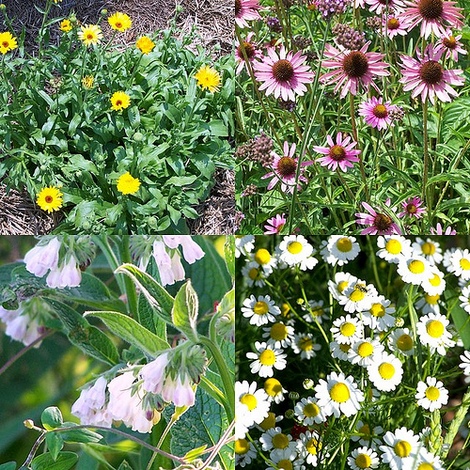Herbal Hair Care
Natural herbs have long been used in hair care and are important ingredients in modern hair products, including shampoos, conditioners, and rinses. While certain plants can help restore the natural colour of hair, fight bacteria, or eradicate fungi from your scalp, others can be effective in cleaning and softening of hair, combating scalp inflammation and itchiness, improving circulations, hampering hair loss, rejuvenating hair follicles, and stimulating the growth of new hair.
Traditionally, rosemary is the moist highly praised herb in hair care. It is reputed to have a full spectrum of hair-friendly qualities and can be recommended as an especially good hair conditioner that makes the hair silky, soft, shiny, and fragrant. Due to its mild colour-restoring properties, rosemary is particularly suited for dark-haired and greying people.
Sage and chamomile are two other herbs that for many centuries have been regarded as an amazing hair medicine. They still have many devoted fans all over the world and are widely used in manufacturing of commercial hair care products. While sage is particularly praised as a hair conditioner and darkener, chamomile is believed to soften the hair and heal irritable scalp and inflammation. Chamomile can also be applied on blond locks as a hair lightener.
Golden flowers of mullein are another natural hair dye that is supposed to brighten blond highlights and benefit the general health of hair. Traditional wisdom also asserts that humble parsley can stop hair loss, thicken the locks and even deepen its natural colour; burdock root is the best remedy against dandruff; southernwood can reverse baldness and increase the growth of new hair; lavender gives the hair a delightful scent; while stinging nettle is a great hair conditioner that can help cure different scalp problems and hair fall, as well.
A great number of natural plants, including yarrow and even kelp, are known to possess strong hair-restoring properties. Supposedly, they can help people suffering from alopecia areata, male-pattern baldness, genetic hair loss, scalp psoriases, dandruff, fungi, and other unpleasant hair conditions. Claims that a particular herb is able to curb hair fall and stimulate re-growth are rooted in traditional wisdom, but, unfortunately, few have been supported by valid scientific research.
Herbs have been effectively used as beauty and hair aids throughout the entire recorded history, and, despite the mass production of hair treatments and cosmetic in our time, many people still prefer to make their own. Not only will it save money, but also will assure that the ingredients you use are all nature-derived and pure, free from synthetic drugs or laboratory-produced chemicals. A great advantage of making hair preparations at home is also that you can experiment and combine the herbs that work best on your scalp and hair, and to find natural hair fragrances that suit your particular taste.
All the ingredients for making your own hair conditioners, lotions, treatments, massage oils and rinses are widely available from drugstores, ethnic stores, and even ordinary supermarkets. The rest can be obtained from specialized online stores, knowledgeable druggists, or well-stocked health-food stores. Many herbal hair recipes, including natural shampoos, soaps, creams, rinses, or simple, water-brewed hair splits, can be prepared in a short period of time, while others, such as fragrant massage oils, spirit-based hair concoctions, or beneficial herbal vinegars, require more time, since they need to be prepared ahead and allowed to stand so that the herbs can properly release and mix their medicinal enzymes and essences.
When making any of herbal hair preparations, use only glass of earthenware containers which are thoroughly clean. If you are a novice, start with following particular recipes that address your hair condition, for example, dandruff, fragile hair, alopecia, or weakening hair roots. Once you have obtained necessary skills and knowledge about different herbs and making your own hair care products, you can start experimenting with mixing various ingredients, to find which combination is most agreeable to you.
You can find numerous natural recipes for the health of your hair on our website. However, before using a particular herb, or a combination of herbs, and especially if you suffer from hay fever or other plant allergies, check your sensitivity by placing a small amount of the new ingredient on the inside of your elbow. If you get a burning reaction, hives, or itching within 24 hours, do not use this herb in your preparations.
Christiana Roberts
Posted on April 29, 2008
Filed Under Hair Care, Hair Loss Treatments
Comments
Leave a Reply

